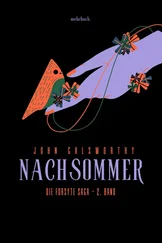John Galsworthy - Maid In Waiting
Здесь есть возможность читать онлайн «John Galsworthy - Maid In Waiting» весь текст электронной книги совершенно бесплатно (целиком полную версию без сокращений). В некоторых случаях можно слушать аудио, скачать через торрент в формате fb2 и присутствует краткое содержание. Жанр: Классическая проза, на английском языке. Описание произведения, (предисловие) а так же отзывы посетителей доступны на портале библиотеки ЛибКат.
- Название:Maid In Waiting
- Автор:
- Жанр:
- Год:неизвестен
- ISBN:нет данных
- Рейтинг книги:3 / 5. Голосов: 1
-
Избранное:Добавить в избранное
- Отзывы:
-
Ваша оценка:
- 60
- 1
- 2
- 3
- 4
- 5
Maid In Waiting: краткое содержание, описание и аннотация
Предлагаем к чтению аннотацию, описание, краткое содержание или предисловие (зависит от того, что написал сам автор книги «Maid In Waiting»). Если вы не нашли необходимую информацию о книге — напишите в комментариях, мы постараемся отыскать её.
Maid In Waiting — читать онлайн бесплатно полную книгу (весь текст) целиком
Ниже представлен текст книги, разбитый по страницам. Система сохранения места последней прочитанной страницы, позволяет с удобством читать онлайн бесплатно книгу «Maid In Waiting», без необходимости каждый раз заново искать на чём Вы остановились. Поставьте закладку, и сможете в любой момент перейти на страницу, на которой закончили чтение.
Интервал:
Закладка:
“Not yet in its dotage.”
She saw his eyes leave her, rest on Adrian across the table, move on to her Aunt Wilmet, and thence to Lady Mont.
“I would like to talk to your uncle the Curator about old families,” he said.
“What else was there in my brother that you didn’t like?”
“Well, he gave me the feeling that I was a great husky.”
Dinny raised her brows a little.
“There we were,” went on Hallorsen, “in the hell of a country—pardon me!—a country of raw metal. Well, I was raw metal myself, out to meet and beat raw metal; and he just wouldn’t be.”
“Perhaps couldn’t be. Don’t you think what was really wrong was your being American and his being English? Confess, Professor, that you don’t like us English.”
Hallorsen laughed.
“I like YOU terribly.”
“Thank you, but every rule—”
“Well,” his face hardened, “I just don’t like the assumption of a superiority that I don’t believe in.”
“Have we a monopoly of that? What about the French?”
“If I were an orang-outang, Miss Cherrell, I wouldn’t care a hoot whether a chimpanzee thought himself superior.”
“I see; too far removed. But, forgive me, Professor, what about yourselves? Are you not the chosen people? And don’t you frequently say so? Would you exchange with any other people in the world?”
“I certainly would not.”
“But isn’t that an assumption of a superiority that WE don’t believe in?”
He laughed. “You have me there; but we haven’t touched rock-bottom in this matter. There’s a snob in every man. We’re a new people; we haven’t gotten your roots and your old things; we haven’t gotten your habit of taking ourselves for granted; we’re too multiple and various and too much in the making. We have a lot of things that you could envy us besides our dollars and our bathrooms.”
“What ought we to envy you? I should very much like it made clear to me.”
“Well, Miss Cherrell, we know that we have qualities and energy and faith and opportunities that you just ought to envy; and when you don’t do it, we feel we’ve no use for that kind of gone-dead, bone-superior attitude. It’s like a man of sixty looking down his nose at a youth of thirty; and there’s no such God-darned—pardon me!—mistake as that.”
Dinny sat looking at him, silent and impressed.
“Where,” Hallorsen went on, “you British irritate us is that you’ve lost the spirit of enquiry; or if you’ve still gotten it, you have a dandy way of hiding it up. I judge there are many ways in which we irritate you. But we irritate your epidermis and you irritate our nerve centres. That’s about all there is to it, Miss Cherrell.”
“I see,” said Dinny; “that’s terribly interesting and I daresay quite true. My aunt’s getting up, so I must remove my epidermis and leave your nerve centres to quiet down.” She rose, and over her shoulder smiled back at him.
Young Tasburgh was at the door. At him too she smiled, and murmured: “Talk to my friend the enemy; he’s worth it.”
In the drawing-room she sought out the ‘leopardess,’ but converse between them suffered from the inhibition of a mutual admiration which neither wished to show. Jean Tasburgh was just twenty-one, but she impressed Dinny as older than herself. Her knowledge of things and people seemed precise and decided, if not profound; her mind was made up on all the subjects they touched on; she would be a marvellous person—Dinny thought—in a crisis, or if driven to the wall; would be loyal to her own side, but want to rule whatever roost she was in. But alongside her hard efficiency Dinny could well perceive a strange, almost feline fascination that would go to any man’s head, if she chose that it should. Hubert would succumb to her at once! And at that conclusion his sister was the more doubtful whether she wished him to. Here was the very girl to afford the swift distraction she was seeking for her brother. But was he strong enough and alive enough for the distractor? Suppose he fell in love with her and she would have none of him? Or suppose he fell in love with her and she had all of him! And then—money! If Hubert received no appointment or lost his commission what would they live on? He had only three hundred a year without his pay, and the girl presumably nothing. The situation was perverse. If Hubert could plunge again into soldiering, he would not need distraction. If he continued to be shelved, he would need distraction but could not afford it. And yet—was not this exactly the sort of girl who would carve out a career somehow for the man she married? So they talked of Italian pictures.
“By the way,” said Jean, suddenly, “Lord Saxenden says you want him to do something for you.”
“Oh!”
“What is it? Because I’ll make him.”
Dinny smiled.
“How?”
Jean gave her a look from under her lashes.
“It’ll be quite easy. What is it you want from him?”
“I want my brother back in his regiment, or, better—some post for him. He’s under a cloud owing to that Bolivian expedition with Professor Hallorsen.”
“The big man? Is that why you had him down here?”
Dinny had a feeling that she would soon have no clothes on.
“If you want frankness, yes.”
“He’s rather fine to look at.”
“So your brother said.”
“Alan’s the most generous person in the world. He’s taken a toss over you.”
“So he was telling me.”
“He’s an ingenuous child. But, seriously, shall I go for Lord Saxenden?”
“Why should you worry?”
“I like to put my fingers into pies. Give me a free hand, and I’ll bring you that appointment on a charger.”
“I am credibly informed,” said Dinny, “that Lord Saxenden is a tough proposition.”
Jean stretched herself.
“Is your brother Hubert like you?”
“Not a scrap; he’s dark, and brown-eyed.”
“You know our families intermarried a long way back. Are you interested in breeding? I breed Airedales, and I don’t believe much in either the tail male or the tail female theories. Prepotency can be handed down through either male or female, and at any point of the pedigree.”
“Perhaps, but except for not being covered with yellow varnish, my father and my brother are both very like the earliest portrait we have of a male ancestor.”
“Well, we’ve got a Fitzherbert woman who married a Tasburgh in 1547, and she’s the spit of me except for the ruff; she’s even got my hands.” And the girl spread out to Dinny two long brown hands, crisping them slightly as she did so.
“A strain,” she went on, “may crop out after generations that have seemed free from it. It’s awfully interesting. I should like to see your brother, if he’s so unlike you.”
Dinny smiled.
“I’ll get him to drive over from Condaford and fetch me. You may not think him worth your wiles.”
And at this moment the men came in.
“They do so look,” murmured Dinny, “as if they were saying: ‘Do I want to sit next to a female, and if so, why?’ Men are funny after dinner.”
Sir Lawrence’s voice broke the hush:
“Saxenden, you and the Squire for Bridge?”
At those words Aunt Wilmet and Lady Henrietta rose automatically from the sofa where they had been having a quiet difference, and passed towards where they would continue the motion for the rest of the evening; they were followed closely by Lord Saxenden and the Squire.
Jean Tasburgh grimaced: “Can’t you just see Bridge growing on people like a fungus?”
“Another table?” said Sir Lawrence: “Adrian? No. Professor?”
“Why, I think not, Sir Lawrence.”
“Fleur, you and I then against Em and Charles. Come along, let’s get it over.”
Читать дальшеИнтервал:
Закладка:
Похожие книги на «Maid In Waiting»
Представляем Вашему вниманию похожие книги на «Maid In Waiting» списком для выбора. Мы отобрали схожую по названию и смыслу литературу в надежде предоставить читателям больше вариантов отыскать новые, интересные, ещё непрочитанные произведения.
Обсуждение, отзывы о книге «Maid In Waiting» и просто собственные мнения читателей. Оставьте ваши комментарии, напишите, что Вы думаете о произведении, его смысле или главных героях. Укажите что конкретно понравилось, а что нет, и почему Вы так считаете.











